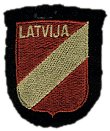A10 305 336
He testified that he was assigned for a transfer as an officer to one of the combat battalions but was then medically discharged (Tr. p. 11971). Meanwhile he had been active in the anti-German underground, for which he was twice arrested by the Germans (Tr. p. 11982). The first time he was arrested for two days and the second time for almost four months (Tr. p. 11993). He was freed through pressure from his friends and his promise to serve in the Latvian Legion (Tr. p. 12004). He opposed the formation of the Latvian Legion but had to serve in it as a company commander. The witness' testimony supports the respondent's description of his own duties and suggests that even those who actively opposed the Germans were obliged to serve in the same Latvian Legion alongside the respondent. He also reiterated the respondent's testimony that the functions of the Annas Street headquarters had nothing to do with the persecution and extermination of Jews.
The witness also testified regarding the Waffen S.S. and the Latvian Legion. He testified that although the Latvian Legion was attached to the S.S., the members of the Legion were not members of the S.S. or the Nazi party. "You had to be a German to be a member of the S.S.," (Tr. p. 1233-12345). He also testified that there were basic differences between the Legion and the S.S. The Legion had nothing in common with national socialist concepts and organizations. In the Legion there was religion but in the S.S., none. At roll call the Legion sang the Latvian national anthem and the Lutheran battle hymn. There was no political indoctrination in the Legion. The uniforms bore the Latvian flag coat of arms on the sleeve and the 15th division had the Latvian rising sun and the 19th division had the Latvian fire cross insignia in place of the S.S. emblem (Tr. p. 12356). He also testified that the respondent served under his command in the Latvian Legion briefly as commanding officer of the 32nd regiment and most of the time as a battalion commander. The respondent was decorated with an Iron Cross for leading his battalion in the battle for mountain 193.4 near the river Velikaja in Russia (Tr. p. 12317). The respondent started serving in the Latvian Legion as a captain and was later promoted to major.
A very important witness on the respondent's behalf was Mr. Paul Hartman. Mr. Hartman served in the United States army during World War II and later became a civilian employee of the United States government. During the war he was in the counter-intelligence corps and became an investigator for the Displaced Persons Commission working out of the British zone headquarters (Tr. p. 1260-12628). Afterwards, he worked for the Central Intelligence Agency and became an expert on the
16
| 1 | Testimony of Eriks Parups, 10-April-1978, direct, transcript pp. 1192–1206. |
| 2 | Testimony of Eriks Parups, 10-April-1978, direct, transcript pp. 1192–1206. |
| 3 | Testimony of Eriks Parups, 10-April-1978, direct, transcript pp. 1192–1206. |
| 4 | Testimony of Eriks Parups, 10-April-1978, direct, transcript pp. 1192–1206. |
| 5 | Testimony of Arturs Silgailis, 11-April-1978, direct, transcript pp. 1227–1238. |
| 6 | Testimony of Arturs Silgailis, 11-April-1978, direct, transcript pp. 1227–1238. |
| 7 | Testimony of Arturs Silgailis, 11-April-1978, direct, transcript pp. 1227–1238. |
| 8 | Testimony of M. Paul Hartman, 1-May-1978, direct, transcript pp. 1260–1312. |
